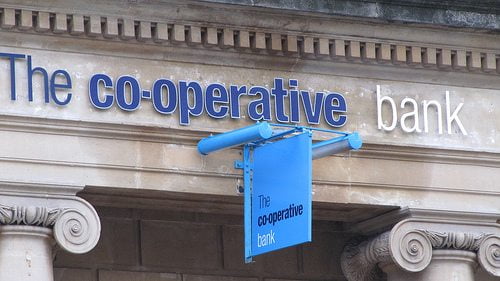

Economy
Governance to blame for Co-op Bank’s failed Lloyds bid, say MPs
Poor governance and incompetence are behind the Co-operative Bank’s woes and its failed bid to buy more than 600 Lloyds bank branches, according to MPs in the Treasury Select Committee. The report also casts blame on KPMG and the Financial Services Authority (FSA).
Blue & Green Tomorrow is currently running a crowdfunder to ensure its survival. Please pledge.
The Co-op Bank discovered a £1.5 billion black hole in its balance sheet last year, leading to hedge funds taking a stake in the bank as it sought to raise capital. This has led to some questioning the bank’s ethical credentials but the bank has maintained ethics are in enshrined its constitution, launching a poll to demonstrate its commitment to its customer’s values.
However, despite the bank’s best efforts, 38,000 current account customers left the bank amid the negative publicity. A previous report has blamed the governance structure for the bank’s troubles.
The Treasury Select Committee has now also highlighted the governance at the bank, describing it as “inadequate” for a bank of any size. It continues that from at least 2009 to 2011 the bank board was too large and unwieldy to allow for meaningful discussion and debate, while financial experience within the board was also limited.
Chairman of the committee, Andrew Tyrie said, “The structure and composition of Co-op Bank’s board was an accident waiting to happen and badly let down Co-op members and customers. Co-op Bank’s governance structure was not fit for purpose for any bank, let alone one bidding to become a major challenger in the UK market.”
Co-op announced plans to purchase over 600 Lloyds branches in 2011, but later withdrew the bid and discovered the capital shortfall. The withdrawal and the length of time it took to discover the issue in the Co-op Bank meant a significant opportunity to establish a UK challenger bank was “scuppered”, MPs said.
The bank’s auditor and the FSA are also criticised for failing to uncover the bank’s capital shortfall until it was too late. However, the report noted that by “far the biggest responsibility lies with the Co-op Bank leadership”.
Tyrie commented, “While it may not have been fully transparent from the start that Co-op Bank’s bid was doomed to failure, it was beset by problems from an early stage. But it was not these problems that killed the deal – it was the capital shortfall that only emerged late in the day.
“An important outstanding questions is whether Co-op Bank’s capital shortfall could or should have been uncovered sooner.”
Photo: Howard Lake via Flickr
Further reading:
Co-op members unanimous on group overhaul
Co-op Bank loses 38,000 customers but slashes first-half losses
Co-op Bank says ethics are in its constitution – but should we believe it?
Co-op party calls for Credit Union membership targets
Co-op Bank’s customer poll ‘essential’ for future of ethical banking


 Features11 months ago
Features11 months agoEco-Friendly Cryptocurrencies: Sustainable Investment Choices

 Energy11 months ago
Energy11 months agoThe Growing Role of Solar Panels in Ireland’s Energy Future

 Energy10 months ago
Energy10 months agoGrowth of Solar Power in Dublin: A Sustainable Revolution

 Energy10 months ago
Energy10 months agoRenewable Energy Adoption Can Combat Climate Change




























